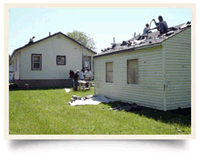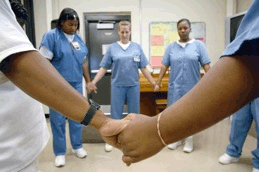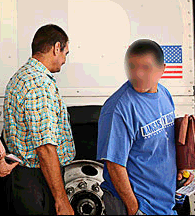How does less crime in our community sound? The Summit County Reentry Network (SCRN) is working hard towards making this not just a dream, but reality.
"America has a very high arrest and incarceration rate. We need to work with the people who are coming back home (from jail/prison)," Terry Tribe-Johnson, Summit County Reentry Coordinator, said.
"Our current Governor has talked about how by December 2011 there is going to be a lot more low level offenders, many who've been incarcerated for 9 months average, who are going to be released. They will need support and services or it's going to be a revolving door," she continued.
One of the founders of Summit County's Victim Assistance Program, Rev. Robert Denton Ph.D., and Executive Director, knows first-hand the danger of releasing more ex-offenders. His office receives phone calls, counselors are at work, and advocates are at crime scenes to helps victims of horrific violence daily.
"I'm concerned and understand the economics of it. If you release a lot of people from prison you need to be selective on how you do that. It's going to happen and we need to manage it. Terry's working on doing just that," Denton said.
"The statistics are pretty clear," he continued, "If you're going to increase the release of offenders you're going to have more victims. So do nothing about it and you're going to be sitting there saying 'Well why didn't somebody do something?' I know our County Executive Russ Pry is very much concerned and is really pushing this thing," Denton continued.
Victim Assistance will be working with the SCRN, giving them information from the victim's point of view.

Reasons for Recidivism
Currently, Summit County has a 39% recidivism rate, meaning that 39% of those released from incarceration will return due to a new offense.
"The SCRN wants to lower that even more by its collaboration with the government, faith-based and non-profit agencies," Tribe-Johnson said. "If people don't go back to incarceration after 3, 5, 10 years, there's a very low rate of them returning to crime."
One of the main reasons for recidivism is lack of positive support for ex-offenders.
"Peer pressure – where they live is number one. Being around positive influences helps them not recidivate. Getting a job, and substance abuse intervention if they need it, is crucial" Tribe-Johnson said.
"Some go back to the neighborhoods where they were and hang around the wrong corners and see the wrong crowd and get back into needing to make money fast. It's really hard to tell somebody that making your money legally in the long run is so much more important than making your thousand dollars a day from a drug trade," Tribe-Johnson said.
She says most of the people caught up in this lifestyle are used to living in the moment. They've never had long-term plans.
"It's the idea of taking people who've been in generation after generation of poverty and haven't had great role models, and helping to retrain their choices and way of thinking and to see new possibilities," Tribe-Johnson said.
"My model is all about how do I help them help themselves? If you teach a man to fish you can help feed him for the rest of his life, but if you give him a fish – he's got one meal," she continued.
"How do we help them help themselves, whether it's reentry, moving out of poverty, or whatever?" she asked.
Having an advocate means the world, she said.
Only half of those who've been incarcerated have a case worker or probation officer to be a point of contact.
"Half of them don't have anybody when they come back, as a point of contact. So we'd like to get the word out that once a month you can come to the Job Center to get some help - from networking, to contacts and information," Tribe-Johnson said.

Learning from other Models
What's currently going on in Dayton, Ohio is a great example of what it takes to help men and women reenter into society.
"The city of Dayton wanted to demolish foreclosed houses. Well, the city offered those contracts to an agency that employs ex-offenders, so it became employment for people with a felony," Tribe-Johnson said.
Truly Reaching You Ministries is an example of that in action right here in Akron.
"They use construction and landscaping projects (to employ ex-felons)," she said.
Michael Starks at the Summit Lake Community Center is also one who makes himself available at any time for those in need. He is a true advocate for those looking to improve their lives.
"We're trying to see what the best practices are in other places. We don't have our strategic plan finalized – but we want to do that," Tribe-Johnson said.

Monthly Meetings
Creating a strategic plan that works will take many people working together to find a way to solve the problem at hand.
"Everybody's services are being cut, it's awful. So we have to really pull together as grassroots individuals and organizations to make sure that we have positive success in Summit County," Tribe-Johnson said, "Now that there's less funding, people want to work together."
The monthly SCRN meetings are open to anyone who provides reentry service for someone who has returned to the community from incarceration or jail, or who has been on parole or probation. Ex-offenders are also welcome, so that they can make the right connections and get the tools they need to rebuild their lives.
"Anyone doing reentry is invited to the meetings -big, small, and in-between. And ex-offenders who have gotten their lives back together can tutor us on what's going to be helpful and what has been helpful," Tribe-Johnson said.
"They are welcome to come because we're trying to share information about what the network is doing," Tribe-Johnson said.
This includes sharing information about what the SCRN is doing and what the subcommittees are initiating.
Jobs and Family Services and the Access to Recovery (a transitional program with federal funding to help people with substance abuse issues and those who have been in in the criminal justice system for the past 5 years) will also be there.

Getting Employers Involved
A future goal of the SCRN is to advocate with employers to consider hiring, on a case-by-case basis, those with felonies.
"We want to talk with employers who have successfully hired someone with a background in the criminal justice system. There are a lot of employers who have," Tribe-Johnson said
"We want this to stop being a hidden factor and start being promoted as 'Wow, you're really helping to make Summit County a safe place by employing someone who has a background, and giving someone a second chance'.
"When someone has done their 15 years and they've paid their fines, why do we keep penalizing that person by not giving them a job? They did their time."
The SCRN's Advocacy Committee has worked very hard on a presentation for employers that will be available soon.
"There are qualified, dedicated, hard-working people who want to turn their lives around. They need employment and if they get employed they can pay their bills and taxes, buy goods and services and boost the economy - let alone pay their fines, child support, court fees or whatever," Tribe-Johnson said.
The economy could benefit greatly from this.
"There's a huge study, I can't even remember the billions of dollars in the U.S. economy that we're missing by not including people who have felonies in the larger population of people that we employ," Tribe-Johnson shared.
"We're hurting our own economy, because these people can make a huge contribution through the goods and services they would buy, and the taxes they would pay. And they wouldn't be a burden needing food stamps and welfare and all of the things that they do to survive," she added.
The SCRN also plans to seek out landlords who are willing to offer housing to those who have a history.
"People need stable housing to get a job and they need a job to pay for stable housing. It goes hand in hand. And that helps them reunite with their families and get on with their life," Tribe-Johnson said.
For more information on these meetings or the SCRN in general, please call 330.643.2003 or email reentry@summitoh.net.
To read Part One of the story click the link.